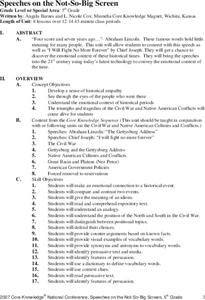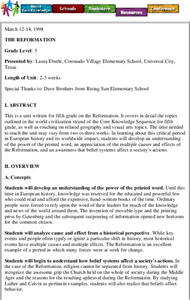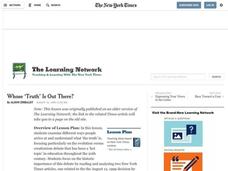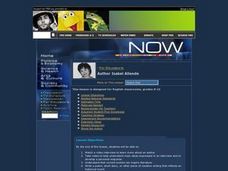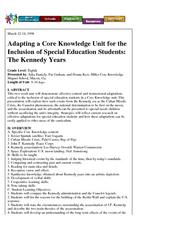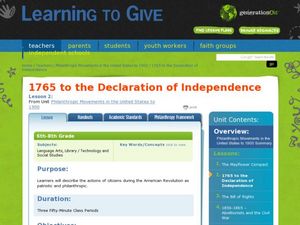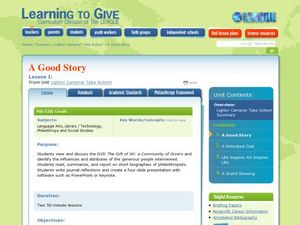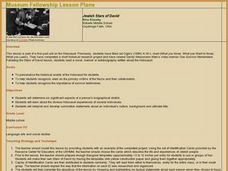National Endowment for the Humanities
From Courage to Freedom
Learners analyze Frederick Douglass' narrative about Christianity and slavery. In this Frederick Douglass lesson, young scholars read his slave narrative and analyze its word choice, imagery, irony, and rhetorical appeals. Learners...
Curated OER
The Gift of Alex Haley’s "Roots"
Historical novels, such as "Roots" by Alex Haley, can make the past come alive.
Curated OER
Johnny Tremain/Boston Tea Party
Fifth graders understand chronological order of events. In this Boston Tea Party lesson, 5th graders compare the events surrounding the Boston Tea Party to current times. Students learn vocabulary and customs of the revolutionary times....
Curated OER
The Treaty Trail: U.S. - Clothing That Talks: Meaning and Material Culture
Young scholars investigate the cultures of Native Americans and Euro-Americans through their clothing. In this photograph analysis activity, students observe historic photographs and analyze the style of clothes people wore and how it...
Curated OER
Five Artists of the Mexican Revolution
Young scholars discover details about Mexican Revolution era artists. In this Mexican Revolution lesson, students research the events and people of the time period. Young scholars then research the artists of the time and create their...
Curated OER
Speeches on the Not-So-Big Screen
Students examine American speeches. In this interdisciplinary lesson, students explore the emotional context of historical periods as they analyze "The Gettysburg Address" and "I Will Fight No More Forever" speeches.
Curated OER
The Reformation
Fifth graders identify key events of the Reformation. They recognize the impact of religion during the Middle Ages.
Curated OER
Confucius Say... China Old
Students locate China on the map. In this Chinese geography, history and culture lesson, students read literature about China. Students participate in paper making, silk making and lantern making activities.
Curated OER
Louisiana's Indian Tribes At the Time of the Louisiana Purchase
Students research primary readings concerning first hand accounts of the Indian tribes living in and around Louisiana's River systems. They complete a brief character sketch of each tribe characterized in the digital readings. These...
Curated OER
Whose "Truth" Is Out There?
Students read article It's a Fact: Faith and Theory Collide Over Evolution, and examine different ways people arrive at what 'the truth' is, focusing on the evolution vs creationism debate that has been a hot topic throughout the 20th...
Curated OER
Literature: Isabel Allende
Students watch and respond to a Bill Moyers Now video on the Chilean author, Isabel Allende. They brainstorm a list of recent events that might inspire writers and choose one to write about in poetic, diary, or short story form.
Curated OER
Lake Tahoe Then and Now
Students investigate the differences in Lake Tahoe from the past to the present. In this geography instructional activity, students read the book Washoe Seasons of Life and identify the descriptions of the land and lake. Students create...
Curated OER
The Kennedy Years
Eighth graders read text and view films about the Kennedy administration. In this preseidential administration lesson plan, 8th graders interview someone who lived during Sputnik, write summaries of lectures, and create posters...
Curated OER
Brother, Can You Spare a Dime?
Students read the novel Roll of Thunder, Hear My Cry to determine how the Great Depression affected teens. They compare the problems faced during the Great Depression to those teens face today.
Curated OER
Learning Empathy Through Art
Students create poems based on the Haiku form and research about WWII. Class discussion and classroom readings of student work finish this lesson. Emphasis is placed on Standards in the Arts.
Curated OER
The Constitutional Convention: Four Founding Fathers You May Never Have Met
Learners read biographies of their assigned Founding Father. They present an oral argument that their assignee deserves to be better known by making connections between regional politics and postions defined by character.
Curated OER
1765 to the Declaration of Independence
Students research philanthropists of the American Revolution. In this philanthropy activity, students watch the video Johnny Tremain and analyze the characters and determine their motives. Students read the Declaration of Independence...
Curated OER
A Good Story
Learners explore the contributions of philanthropists. In this philanthropy lesson, students watch "The Gift of All: A Community of Givers." Learners then read biographies of philanthropists and create PowerPoint presentations about the...
Curated OER
Railroad Idioms Art Lesson Plan
Sixth graders research railroad idioms. In this idiom lesson, 6th graders read through a glossary of different railroad idioms and their meanings. They illustrate a chosen idiom.
Curated OER
Remembering to Never Forget
Young scholars discover how the history of a place or event affects one's present perceptions of that place or event. They examine the current tensions caused by the decision to make Weimar, Germany Europe's cultural capital.
Curated OER
Rudyard Kipling's "Rikki-Tikki-Tavi": Mixing Fact and Fiction
"Rikki-Tikki-Tavi," from The Jungle Book, offers young readers a chance to examine how Rudyard Kipling uses setting and personification to bring to life the brave mongoose who battles cobras to protect his family. Class members explore...
Curated OER
PARAMILITARY VIOLENCE AND THE CONFLICT IN NORTHERN IRELAND
Students examine documents to reconstruct the past, employ processes of critical historical inquiry to reconstruct the past, analyze aspects of the Northern Iereland conflict through perspectives of documents, and write a short position...
Curated OER
Jewish Stars of David
Middle schoolers examine the history of the Holocaust and complete a KWL chart. Using the Internet, they research an aspect of the Holocaust they are interested in and watch a documentary. They read testimonies of survivors and identify...
Curated OER
From One Child to Another: Letters about the Holocaust
Students read biographies of students who survived the Holocaust and write letters describing the effects of those stories. They select one biography and write a letter to that child, telling how the biography affected him or her.







